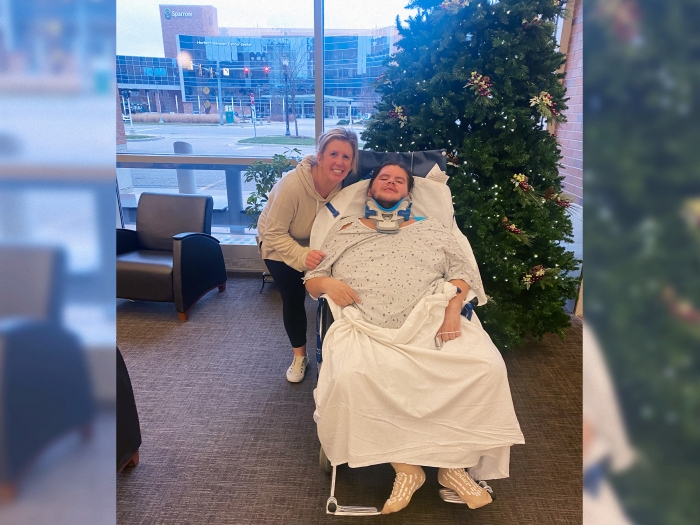New research uses a unique survey tool to understand how caring for a person with TBI impacts the caregiver’s mental health and well-being.
1:24 PM
Author |

Quality of life is important for persons with traumatic brain injury, and new studies find it's just as important for the person's caregiver.
"Caregivers are often not the focus of treatments; It's usually about the patient or person with the condition," says Noelle E. Carlozzi, Ph.D., an associate professor of physical medicine and rehabilitation, and director of the Center for Clinical Outcomes Development and Application at Michigan Medicine.
She is the leading author of several papers included in a new special edition of Rehabilitation Psychology that examine quality of life in caregivers of persons with TBI.
"The special issue focuses on the diverse ways that caring for an individual can impact well-being, including family life, mood, physical health, sleep and social relationships," says Carlozzi, also a member of the University of Michigan Institute for Healthcare Policy and Innovation.
A unique tool
The papers in the special issue highlight the research team's focus on understanding the experiences of caregivers of persons with TBI, and illustrate the team's ability to efficiently capture those experiences through a tool Carlozzi created called the TBI-CareQOL Measurement System.
"We developed the TBI-CareQOL tool as a way to have standard measures for quality of life in caregivers of persons with TBI," Carlozzi says. "We're able to use the same measures across multiple studies, which allows us to compare and contrast findings to move research forward faster."
The tool was validated through previous research by Carlozzi and her colleagues, and one of its unique features is the ability to administer surveys as 'smart tests.'
"This means the individual only sees the items that are most relevant to them, since the survey administers items based on the respondent's previous answers," Carlozzi says. "This is important because it saves our respondents' time, as they're not answering questions that aren't pertinent to them. It also helps ensure we aren't collecting unnecessary data, or data that the respondent felt they had to supply an answer to even if it isn't truly applicable to them."
The papers included in the special issue utilize the TBI-CareQOL to analyze quality of life in caregivers of both military members and civilians who experience a TBI. The special issue highlights the common experiences caregivers of persons with TBI share, as well as experiences and challenges faced by caregivers for military personnel who have experienced a TBI.
"We also want to draw attention to the different problems that caregivers encounter," Carlozzi says. "While there are certainly a number of common experiences for caregivers of civilians and caregivers of service members and veterans, caregivers of military personnel often feel the need to suppress their emotions, or put on a brave face for others. They often find themselves being constantly on guard trying to protect the person with injury from further harm."
Future work
Carlozzi hopes the work included in the special issue, as well as the fact that there is little research available to physicians that focuses on the caregiver, demonstrate the need for continued research on this topic.
"We hope that all of this work will encourage clinicians to pay a bit more attention to the caregiver, even when the focus may be primarily on the person with TBI," Carlozzi says.
She also notes this research will be helpful when finding interventions for caregivers of persons with TBI.
"We need interventions to improve quality of life for caregivers, and this research can lay the groundwork for doing just that," Carlozzi says.
Paper cited/DOI: "Special Issue: Caregivers of Service Members/Veterans and Civilians With Traumatic Brain Injury," Rehabilitation Psychology. 2020, Volume 65, Issue 4 (Nov).
Collaborators: James A. Haley Veterans' Hospital – Tampa, Florida; Northwestern University; TIRR Memorial Hermann; Rehabilitation Institute of Michigan; University of Delaware; Walter Reed National Military Medical Center
Funding Acknowledgements: National Institute of Nursing Research; Defense and Veterans Brain Injury Center
For more information about the Center for Clinical Outcomes Development and Application, please visit its website.

Explore a variety of healthcare news & stories by visiting the Health Lab home page for more articles.

Department of Communication at Michigan Medicine
Want top health & research news weekly? Sign up for Health Lab’s newsletters today!





